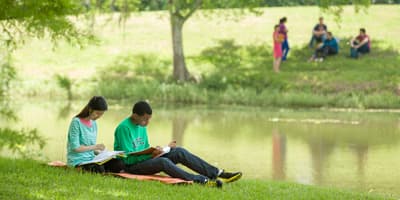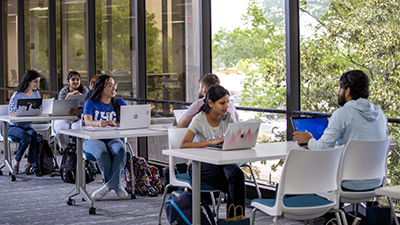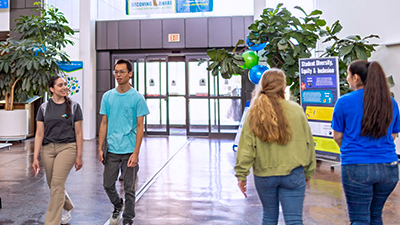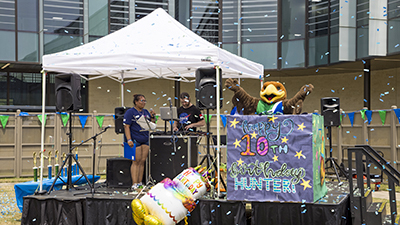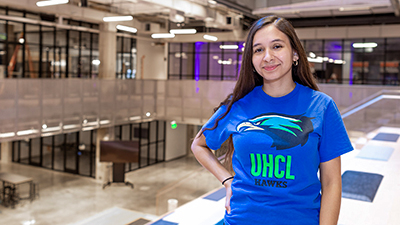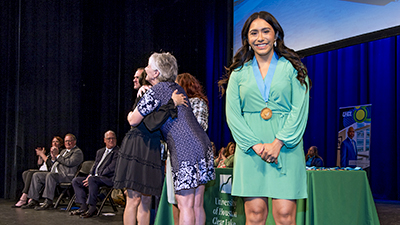Effective initiatives, support systems help record number of UHCL students graduate

University of Houston-Clear Lake’s commencement ceremonies are always packed with graduates and their families, but the spring 2023 event, held at NRG Arena on May 13, was a bit more crowded than usual. That’s because 1,193 students received their diploma—the highest number the university has ever graduated.
UH-Clear Lake is a designated Hispanic-Serving and Minority-Serving Institution, with over half its population transfer and first-generation students, and first-time-in-college students. Keeping students engaged and supported throughout their academic journey is among its top priorities.
Associate Vice President of Student Success and Initiatives Tim Richardson said that of all UH-Clear Lake’s initiatives to influence students toward success, the most important one is that the university community cares for its students.
“We have a very caring campus,” Richardson said. “Our numbers have been trending upward over the last few semesters. The first credit goes to the students. We have a large non-traditional student population; they work and have families and have so much to balance, and we’re on the heels of COVID. We know what they’ve been going through.”
There are a range of initiatives through the university’s Division of Student Affairs, including academic advisors, tutoring staff in the Student Success Center , the Writing Center , the Accessibility Support Center and more, that exist to stand in the gaps when students encounter challenges that could actually derail them from their academic path.
“We have done a lot of work revising academic advising to be a much more proactive model,” Richardson said. “We are doing more than just telling students to register for classes. It’s a more holistic approach; we want to know how they’re doing. We’re partnering with them in understanding how best to walk with them through to end.”
The redesign of academic advising, Richardson explained, has improved communication and reduced advisors’ caseloads. “All this adds up to more time and opportunity for staff and students to meaningfully connect,” he said. “There is time built in so they’re not just talking about classes. Staff and advisors are asking more about what’s going on in students’ lives and directing them to services that might be beneficial.”
He added that there has been reorganization in the Student Success and Math Centers. “We partner with faculty and we can embed a tutor in certain courses, and they engage with students while in the class,” he said. “We can make sure students work with faculty to receive just-in-time support during class. That’s been successful and exciting.”
Vice President for Student Affairs Tina Powellson said that additional financial resources available in the Office of Student Advocacy help students when they encounter an unforeseen circumstance, such as the loss of a job or an expensive car repair, that could cause a student to stop coming to class.
“The Hawk Emergency Fund grant and the Basic Needs grant addresses students with food and shelter insecurities, as well as a technology package so that students who need laptops can receive them,” she said. “We believe students should have holistic support. When they enroll, they find the services that will help them be successful. We have great classes, but we also have wraparound care to make sure they can get to the end.”
Richardson said the division was committed to continuing this upwardly-trending number of successful graduates by creating new initiatives that target at-risk populations within the student body.
“We are designing a peer-mentoring program this summer as targeted programming to address achievement gaps in the fall,” he said. “We have seen the clear benefits of peer mentorship for at-risk students, and we are finding more ways to expand these programs.”
The Summer Engagement Academy is a new Student Success Center initiative that Richardson said would support incoming students by giving them opportunity to get oriented to campus while taking two credit-bearing courses to ensure they have a smoother, more successful transition from high school to university.
“We build a net,” he said. “Students face difficulties. No support system we have can stand alone. We work collaboratively. There’s not a door we won’t knock on for our students, and there’s no faculty member I couldn’t call and ask for help for a student.”
When students hold up signs of gratitude at commencement, they may be thanking their professors, but Richardson said it’s really about their accomplishment.
“They’re the ones who got there,” he said. “We are here to help them value the ownership of their education. The reason we had such a huge commencement is because of the care we have built in our campus community, and students know they are at the center of that.”
The Student Success Center offers academic coaching, tutoring and other initiatives to keep students on track. Learn more at www.uhcl.edu/student-success-center/ .

